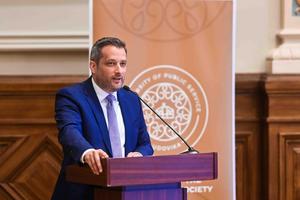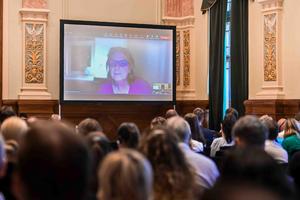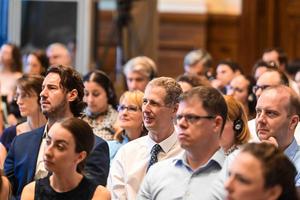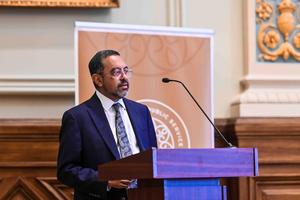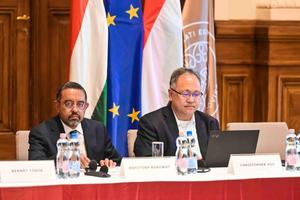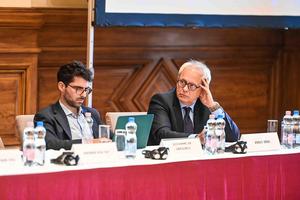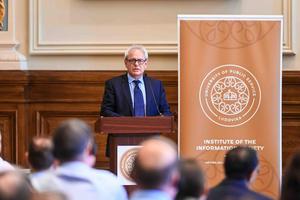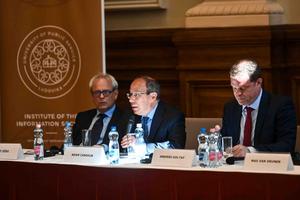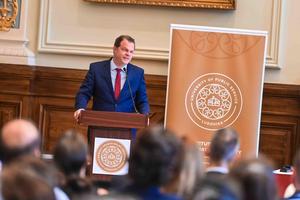The third conference on internet platforms was held at the Ludovika University of Public Service (LUPS) on June 25th. The event, titled "Society of Internet Platforms," was organized by the Information Society Research Institute (ITRI) of the Eötvös József Research Center (EJRC) and featured distinguished international speakers and university researchers discussing the role of artificial intelligence in the future of the internet.
In his opening speech, Bernát Török, Director General of the EJRC, emphasized the goal of continuing transatlantic dialogue to develop new platform regulation solutions. He highlighted the significant impact of new technologies on society and noted Europe's support for regulating internet platforms. He cited examples such as the GDPR, the Digital Services Act, the Digital Markets Act, and the forthcoming AI regulation law in the European Union. He also mentioned the "Brussels effect" felt in the United States.
Török argued that it is challenging to reconcile new practical norms with traditional legal systems and that it is essential to apply new regulations in a way that balances the social benefits and potential societal risks of platforms. Citing Robert Post, a professor at Yale Law School who spoke at last year's conference, Török noted that the internet, due to its vastness, poses a significant threat to modern democracies because it is too large to be controlled by human judgment alone.
Török emphasized the necessity of empowering artificial intelligence to regulate the internet and advocated for developing regulations that bridge AI and law. He also referred to Pope Francis's speech at the G7 summit, which stressed the need to balance new and traditional regulations and the tools of AI.
Mireille Hildebrand, a Dutch lawyer and philosopher from Radboud University, who works on the intersection of law and technology in Brussels, highlighted the importance of understanding automated systems to make automated decisions and stressed the need for cooperation with IT experts to protect the rule of law. In her online presentation, she advocated for developing new legal tools and methodologies to strengthen the system of checks and balances and IT technologies. Hildebrand pointed out the gap between the creation of laws and their practical application, noting that rules are always context-dependent and that positive law creates a form of social order. She argued that lawyers must better consider subjectivity to protect the rule of law.
Ashutosh A. Bhagwat, a professor of law at UC Davis School of Law, discussed social media regulation. He noted that social media has become the primary arena for policy and politics over the past six years, but the technological landscape is continuously changing. Since 2018, various governments have taken active steps to regulate social media, but the complexity of the system makes it difficult to see the boundaries of the regulations. Bhagwat highlighted the dominance of social media, which he said has overwhelmed traditional media, with about 50% of average Americans getting their information exclusively from the internet. He noted that Canada and Australia are already working on regulations to prevent Facebook from publishing news. The professor also pointed out that social media algorithms generate a lot of disinformation that significantly influences public discourse. Unlike traditional media, online platforms allow for anonymity, leading to frequent hate speech based on race or gender. He also mentioned influencers who can shape young people's worldviews.
Bhagwat recalled that social media regulation began only in 2018. Previously, it seemed that Facebook would control the entire world due to its rapid spread, but user numbers have significantly declined since the emergence of TikTok in 2017, which has been banned in several countries. He noted that lawmakers cannot predict technological developments 3-5 years in advance, as it takes that long to introduce new regulations.
Zsolt Ződi, a senior research fellow at ITRI, discussed whether code overrides laws. He recalled that with the advent of the internet, technology became a tool for behavior regulation, bypassing human action. Ződi emphasized that besides technology, other social forces shape the law, and he discussed the importance of various regulations. He noted that the state increasingly regulates different areas of life to prevent crises, disasters, accidents, and pandemics. He described platforms as ecosystems combining data, algorithms, and users, and confirmed that algorithms significantly influence our behavior, but he believes that traditional law is not "dying."
The conference also covered AI law regulatory models, platform competition, the evolution of digital constitutionalism, the use of AI in internet knowledge bases, and the protection of media freedom.
In his closing remarks, András Koltay, President of the National Media and Infocommunications Authority (NMHH), noted that the effects of the EU's online platform regulations are still unknown, making European legal thinking akin to "shooting at a moving target." He emphasized that in the digital space, the rights of all actors, including users and technology providers, must be protected. Koltay expressed hope that traditional media would survive in the world of online platforms. He discussed the impact of accelerated technologies, highlighting that it is impossible to solve every problem with regulations due to the speed of decisions made by algorithms and AI.
Koltay pointed out that new platforms raise new issues, requiring different regulations across continents, none of which can be final. He believes that Europe has stronger regulatory foundations than the United States, but these topics need to be revisited as final answers have yet to be found.
Text: Réka Zsuzsanna Szabó
Photos: Dénes Szilágyi


